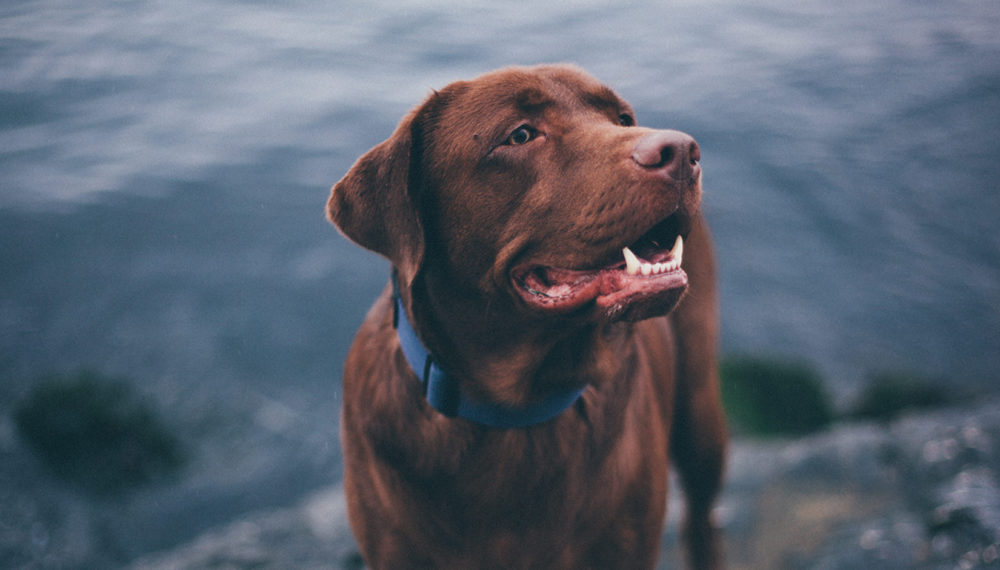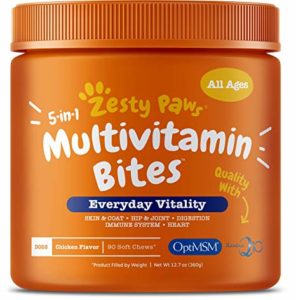If you’re noticing that your dog’s coat isn’t as shiny and healthy as it used to look, there’s a good chance that your pet suffers from zinc deficiency. This trace mineral plays a vital role in ensuring that the immune system remains in tiptop shape.
A lack of zinc in your dog’s daily diet can negatively impact the production of enzymes, hormones and proteins as well. While high-quality pet food contains an adequate amount of zinc, there are cases that call for zinc supplementation.
Best Dog Zinc Supplement
Zesty Paws Multivitamin Treats for Dogs
A quick look at benefits and dangers of zinc for your dog:
Benefits:
- Boosts the functions of the immune system
- Improves skin coat quality
Dangers:
- Causes zinc toxicity when done incorrectly
Zinc Absorption and Sources
As a dog owner, it’s worth understanding that zinc isn’t highly absorbable. According to studies, only 5% to 40% of ingested zinc gets absorbed. Even if you crunch some numbers to determine how much zinc your dog gets through daily diet, it can still fall way short of the daily recommended dose.
Based on the guidelines by the Association of Feed Control Officials, the minimum recommended daily zinc consumption for both adult dogs and growing puppies is 120mg/kg. On the opposite side of the spectrum, the maximum amount is 1,000 mg/kg.
You must also learn that the absorbability of zinc is affected by the consumption of other essential minerals. For example, fiber and calcium are known to bind zinc, thus reducing its rate of absorption. Meat also contains higher concentrations of zinc compared to plant sources.
Some dog breeds are genetically pre-disposed to have a difficult time absorbing zinc. This is very common among northern breeds such as the Siberian Husky and Alaskan Malamute, which explains why they usually suffer from zinc responsive dermatosis. Couple this with the fact that zinc has a low rate of absorption and you have a strong case to start using zinc supplements.
Choosing the Right Supplement
You may not realize it, but the products you use to maintain the quality of your dog’s coat come with supplemental zinc. Quality vitamin supplements also contain this trace mineral.
This is important to keep in mind as too much zinc can actually be detrimental to your pet’s health. Letting your dog take supplements doesn’t always mean you’re doing the right thing. When done without adequate knowledge and supervision, it can lead to zinc toxicity.
The Dangers of Zinc Supplementation
It’s rare for zinc to reach toxic levels in dogs, and it’s something you don’t want to find yourself dealing with. In most cases, the ingestion of objects that contain high levels of zinc such as batteries, automotive parts, zinc-oxide creams, and post-1983 U.S. pennies is the reason for zinc toxicity.
Over-supplementation is another culprit. As a pet owner, you might have a tendency to self-diagnose the condition of your dog. You might believe that your dog needs additional zinc, prompting you to buy supplements without consulting the vet. Zinc overdose can ultimately lead to fatal toxicosis.
As always, it is recommended to seek the advice of a qualified veterinarian for the proper diagnosis of your dog. The veterinarian will conduct laboratory tests to determine the zinc levels in your dog’s blood. Take this as an opportunity to ask pertinent questions about any symptoms your dog suffers from and what you can do about them.
Once you get the go signal, it’s time to look for a high-quality zinc supplement which you can pair with your dog’s healthy diet.























